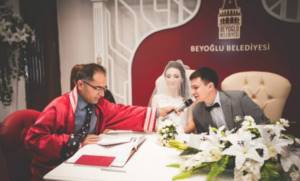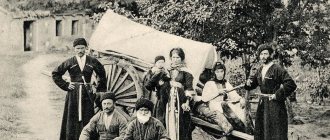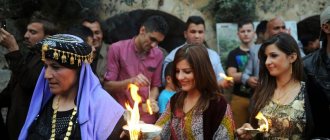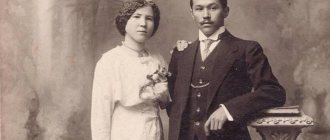Türkiye is an amazing multinational country with a rich history. The fusion of beliefs and rituals of the many nationalities that inhabited the territory gave rise to a stunningly beautiful original culture. The development of the Muslim country was also greatly influenced by Eastern and Christian customs. The influence of modern European trends cannot be denied, as an increasing number of young Turks study in European countries and partly adopt their way of life. A Turkish wedding is a sparkle of luxury and fun, memorable for a lifetime.
A magnificent wedding proves the wealth of a young family and becomes a source of pride. Every action of the bride and groom, as well as their relatives, is filled with deep meaning.
Wedding preparations
Usually a wedding in Turkey takes place at the end of the week, before Sunday. The bride and groom begin preparing for the most significant event in their lives on Monday. This day can be called the beginning of the wedding ritual.
- After the matchmaking, the groom's relatives invite the girl on a shopping trip. The bride can choose whatever she likes: jewelry, clothes and shoes. The list may include household items for your future home, and even furniture.
- The groom is also not left deprived. He goes shopping with the bride's family. On this day, the items purchased should include a branded wristwatch that will serve faithfully throughout your life.
- The future husband orders the bride's wedding dress; this is his only responsibility.
- On Monday, the girl’s dowry, lovingly collected over several years (or quickly bought in a store), is transferred in a ceremonial move to the house where the new family will live. This could be the house of the groom's parents or a separate home, which, according to tradition, is purchased by the groom. This process demonstrates to everyone that the bride is wealthy and not a white-haired woman.
- Tuesday is dedicated to bath and cosmetic procedures. A visit to the hammam is a must, along with all willing females who will come to support the young woman. A massage is ordered, the body, face and hair are tidied up. All this pleasure is paid for by the groom.
- Henna night is a spectacular and exciting ceremony on the eve of the wedding; as a rule, it is dedicated to Wednesday. It symbolizes the girl’s farewell to her home and her transition to a new family and life. It is held on the women's side of the future family home. She is dressed in a dress of the finest workmanship, with hand embroidery in the national style, called bindalli. Often, this is a girl’s first luxurious dress. Such outfits are passed down from generation to generation, carefully preserved in families and are considered the sacred heritage of the family.
The bride's face is covered with a red veil embroidered with gold. The henna for the ceremony must belong to the groom's family, as well as the silver tray on which it will be poured. Also, there are two candles on the tray. The future mother-in-law rolls out a roll of natural silk at the bride’s feet, which the bride will keep.
The girl is showered with coins, promising her financial well-being and a happy marriage, and the girlfriends invited to the sacrament go around those present with candles in their hands. The bride walks along the silk cloth to the groom's mother and bows respectfully, kissing her hand. By this showing her complete power over herself and respect.
Then everyone is invited to a tea table with fruits and national sweets. Compassionate, farewell songs are sung.
It is considered a good sign if the bride begins to cry. Tears shed this night promise happiness in marriage.
Next, the main part of the ritual begins. The groom's mother places a gold coin in her daughter-in-law's palms and covers it with henna.
Then the palms, fingers and big toes are painted with henna dye. This is done by one of the invited women, the happiest in family life. The ligature of patterns has a sacred meaning. Sometimes the groom's initials are woven into the pattern. If he fails to find them, he gives his future wife a gift. They sign the hands of the bridesmaids - this helps to quickly find your betrothed. Such drawings gradually become brighter and acquire full colors just in time for the wedding.
The night of henna is celebrated until the morning, during which time the bride should not leave the women's society. Such a ritual can be celebrated only once, to an innocent girl, which gives it even greater value and significance. Men are not allowed to attend the holiday; on this night they walk separately in a purely male group. However, modern youth unites by morning, further celebrating together.
On the night of henna, a girl draws water from a street well, kneading dough with it. The pies baked by the future wife are scrupulously judged by all those present. If they are even, one to one, tasty, then, according to legend, there will be harmony in the family, and troubles will be spared.
Bride and groom outfits
Despite pro-Western trends, a Muslim girl’s wedding dress is selected to best suit ancient customs. Even the most tolerant families in this regard try to choose an outfit that will not shock the public. Mini dresses, very open chests and backs are not acceptable. It is recommended to tie at least a beautiful lace scarf on your head.
The traditional dress carefully covers the arms, neck and shoulders. A floor-length skirt can be full or straight with pleats at the back. The emphasis is on luxurious embroidery, often with gold and silver threads, jewelry made from natural precious stones, fine lace and expensive, high-quality fabric.
The hair is completely tucked under a headdress in the national style, and a veil is attached on top. A bright scarlet wide belt symbolizes the bride's virginity. Previously, shades for wedding dresses were chosen in red. White dresses are a tribute to Western fashion and came to Turkey quite recently.
The groom's suit is made of high quality fabric. Strict, dark colors with a white shirt and tie.

Where and how newlyweds are registered
In Turkey, there are two ways to officially register a marriage. The social event is registered by the local registry office employee. Everything happens roughly the same as with us: the newlyweds drive up to the wedding palace and sign their names, receiving marriage certificates in their hands.
This is surprising for residents of Russia, but in Turkey, employees can arrive at the venue of the festival without requiring additional payment, and complete documents on the spot.
Muslim weddings take place in a mosque. The newlyweds perform namaz, after which the imam blesses them for family life.

Engagement
A wedding in Turkey is necessarily preceded by an engagement. Since it is not yet an official registration of marriage, each family can conduct it differently. There are no strict rules on this matter. Some families set the table and invite friends. Others rent a wedding salon. And some young people simply put rings on each other, but always with their family. The groom usually gives his bride a ring with one stone, usually a diamond. Not all Turkish women will agree to get married without such a symbolic gift.
Engagement (in Turkish “nishan”) is, in essence, voicing an agreement about your intentions in front of everyone. Therefore, the families of the bride and groom, or at least the parents of the young people, must be present at this event. Very often during the engagement, plans for the future life of the newlyweds and relationships between families are discussed, and many organizational issues are resolved.
An engagement, like a wedding in Turkey, is a very serious event in the life of a newlywed. Nowadays, in big cities, after an official engagement, young people can decide to live together. But in families with strict views or in small villages, living together is possible only after marriage. In Turkey, traditions are very strong and are sacredly observed by many families.
Wedding traditions in Turkey
The wedding begins in the evening so that everyone who is interested and invited has time to gather and celebrate on an incredible scale. Relatives, friends, acquaintances of acquaintances gather - a party for 800-1500 people is far from uncommon. Anyone can come into the courtyard or banquet hall on this day, wish the young people happiness, and dance.
There is no feast in the usual Russian style. No alcohol, ten courses, drunken fights. Refreshments, both purchased and national, are placed on the tables. Sweets, obligatory wedding cakes, pastries. The customs at a Turkish wedding are also quite remarkable, revealing deep meaning.
- When the groom picks up his bride on the wedding day, a child meets him at the door, demanding a ransom.
- Great emphasis is placed on gold and money. They decorate the hall with them, make decorations for the newlyweds, sprinkle them with handfuls of coins, wishing them well-being and wealth.
- Guests gather to congratulate the newlyweds; refreshments are secondary here. Expensive, meaningful gifts accepted. The closer the relationship, the more valuable the gift will be expected. Money is pinned directly on the newlyweds’ outfits, jewelry is put on right away.
- The newlyweds' entrance is always celebrated with pomp, with music and acrobatic performances.
- One of the most important parts of the holiday, even in cities, is the traditional wedding dance. The musicians play a fiery national melody, the young people go out onto the platform and dance an ancient folk dance to the sound of friendly applause.
- Mandatory gifts for the bride are gold jewelry, bracelets, and chains presented by the groom's parents.
- By the end of the evening, the bride and groom look like Christmas trees, hung with precious garlands, and the contents of the handbag can be safely deposited in the bank as a solid capital. The gold given for a wedding may not be of very elegant workmanship. This is, first of all, starting capital for a young family.
- When newlyweds cross the threshold of their home as husband and wife, they observe several beliefs. A glass is broken on the threshold so that all quarrels remain in the past. The door frame is oiled so that life runs smoothly, and bread is broken over the girl’s head for well-being.
Usually, who gives what at a wedding is carefully recorded. In turn, being invited to the celebration, the young people will have to give no less valuable gifts. In this sense, specially issued gold coins, “republican gold”, which can be purchased in jewelry stores and handed over there if necessary at a set price per gram, are very helpful.
Modern Turkish youth, having moved away from the precepts of their grandfathers and religious tenets, celebrate weddings in Western style. Here the bride's outfit can be more revealing. The number of guests is not so amazing, only a couple of hundred. As a rule, a restaurant banquet hall is rented; the musical accompaniment may consist of modern popular melodies. Snacks and hot dishes are served on the table.
An interesting custom is a luxurious plastic cake, which is ceremoniously brought out for everyone to see. Hidden inside is a simple flat-shaped sponge cake, which is cut into equal pieces. The newlyweds feed it to each other and treat their guests. This strange move is due to the fact that the decorated multi-tiered product cannot be cut evenly.
Another shock for a Russian may be the removal of an artificial wreath, one of those that we usually buy for funerals. Such wreaths are given for any significant occasion, both joyful and not so joyful. The only difference is in the decoration: for a happy event the wreath is decorated with bright ribbons, and for a sad one - with mourning ones.
The first dance is opened by the newlyweds, after which everyone dances. After all, a Turkish wedding is, first of all, dancing until you drop, fun, beautiful songs, a lot of music. After the feast, all those present are presented with shells decorated with white chocolate candies.
How the ceremony of removing a veil from a bride takes place in Turkey can be seen in the following video.
The beginning of family life
The first wedding night is the final stage of wedding celebrations. In Muslim families, great importance is attached to the purity of the bride.
- An old-fashioned custom is still preserved in Turkish villages. Spouses who have spent the night together hang out the “virgin scarf” - the sheet on which they slept - for public judgment. If there is no blood, the girl may well be returned back to her parents in disgrace.
- The groom's relatives visit the newlyweds after the wedding; the young wife must demonstrate all the dowry with which she came to the family. This custom is especially strong on the Black Sea coast. The insufficient quantity and quality of things, according to the new relatives, is a reason for misunderstandings.
Marry a Turk
Turkish men are very courteous and colorful in appearance. As a rule, they stand on their own feet and know how to provide for their family. Ladies who have found love and are going to marry a Turkish man should take into account several important points.
- The spouse should dress extremely modestly when leaving the house. On the contrary, home clothes are elegant and emphasize all feminine virtues.
- No strangers - this is a strict prohibition, even if it is an old friend.
- The will of the mother-in-law in the house is the law for the daughter-in-law. And the husband’s word is decisive and cannot be appealed. But this does not mean that the spouse cannot be persuaded. A wise wife is quite capable of directing a man’s thoughts in the direction she wants without scandals.
- You will most likely have to give up your job. There are few work opportunities for women in Turkey, and a married woman working is something out of the norm. Although, recently Turkish ladies have achieved some changes in relaxations
- The Muslim faith does not allow a wife to deny her husband intimacy. Likewise, you should not take the initiative or behave uninhibitedly.
If these differences in family and cultural life do not frighten you, and your feelings are strong, advice and love, as they say!
Wedding celebrations in Turkey retain all the charm of their uniqueness. Alien values bursting into the life of this large country have not yet crippled its national flavor. To attend a traditional Turkish wedding means to plunge into the unique culture of this people.
Necessary documents for marriage registration
If a couple wants to hold only a symbolic wedding ceremony, then they do not need any additional documents other than international passports, insurance for the period of their stay in Turkey and hotel reservations. Upon arrival, the newlyweds pay a visa fee for tourists, and then can freely stay in the country for up to 30 days. If the newlyweds decide to hold an official ceremony, then they need the following documents:

- Foreign passports.
- Passports of citizens of the Russian Federation.
- Birth certificates.
- Certificate of death of a spouse or divorce (if any).
- If one spouse has not reached the age of 18, then the consent of his parents, certified by a notary, is required.











